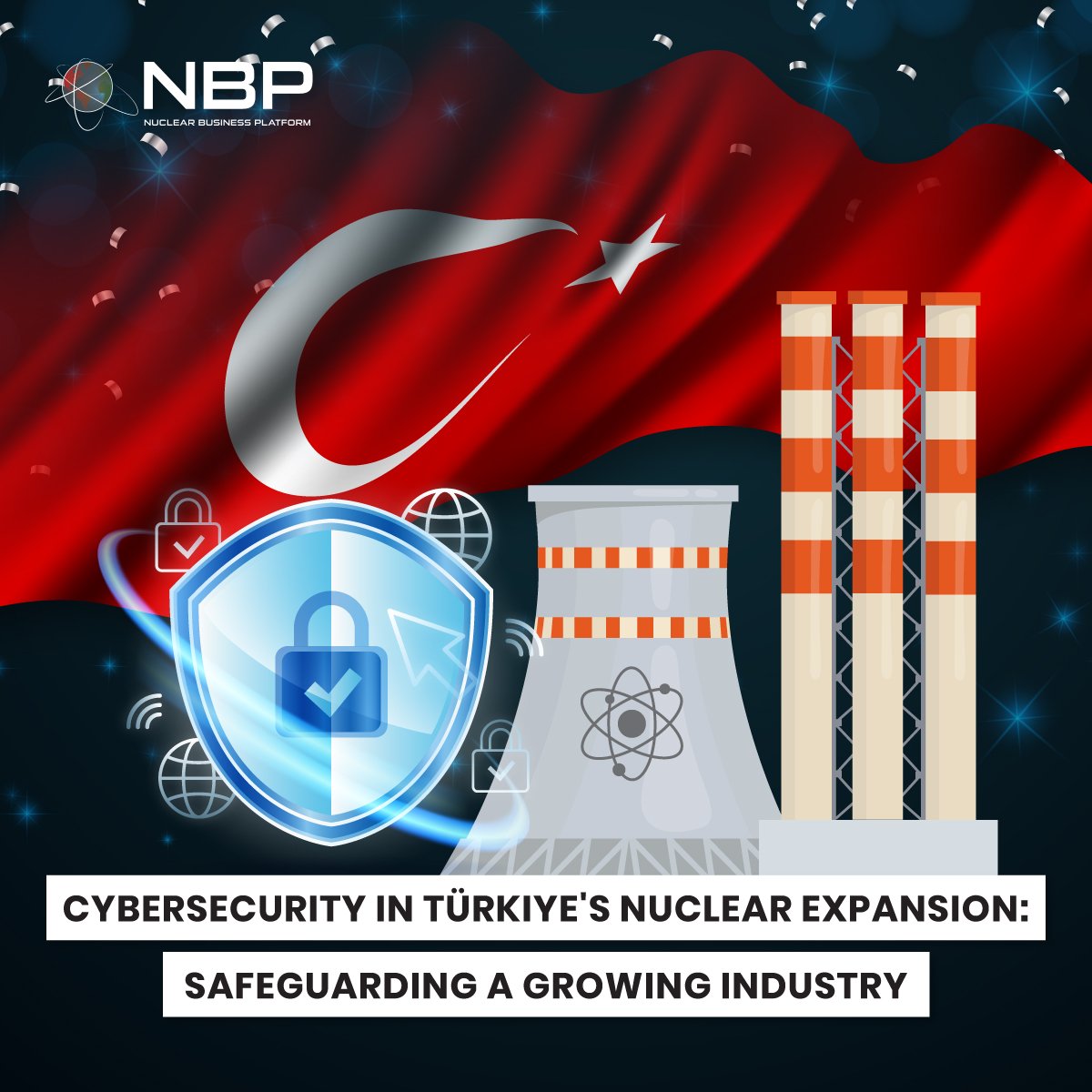Cybersecurity in Türkiye's Nuclear Expansion: Safeguarding a Growing Industry
Türkiye is pursuing an aspiring goal of achieving 20 GW of nuclear power capacity by 2050, demonstrating a clear vision for a secure and diversified energy future. This initiative encompasses the development of both large-scale nuclear power plants (NPPs) and Small Modular Reactors (SMRs). To date, 4.8 GW of capacity is under construction at Akkuyu, another 4.8 GW is planned for Sinop, 5.6 GW is projected in the Thrace region, and an additional 5 GW from SMRs is expected after 2035. These efforts establish Türkiye as a key player in the global nuclear energy sector.
While Türkiye’s nuclear expansion marks significant progress toward energy security, the growing complexity and scale of this infrastructure necessitate a strong focus on safeguarding its operations. Ensuring the cybersecurity of Türkiye’s nuclear facilities is critical to protect key systems and infrastructure from potential threats. As the nuclear sector evolves and operational technologies become more interconnected, the need for robust and effective cybersecurity measures becomes more apparent. These measures are essential to maintain operational reliability, secure sensitive information, and support Türkiye’s broader energy objectives.
Cyberattack Vectors and Vulnerabilities in Nuclear Facilities
Nuclear plants present multiple potential attack vectors that could be exploited by malicious actors. The most significant include communication networks, programmable logic controllers (PLCs), sensors, actuators, and human operators. Each of these components is critical to maintaining the safe operation of a nuclear facility, and their compromise could have disastrous consequences.
Communication Networks: These networks are essential for transmitting sensor data and control information. Vulnerable to denial of service (DoS) and man-in-the-middle (MITM) attacks, any disruption can lead to faulty decision-making and hazardous conditions.
Programmable Logic Controllers (PLCs): PLCs control nuclear plant functions but are susceptible to cyberattacks, such as logic manipulation and replay attacks, which can delay or prevent necessary interventions during emergencies.
Sensors and Actuators: Crucial for monitoring vital parameters like reactor temperature and pressure, a targeted attack on sensors can cause inaccurate readings, triggering unsafe conditions or safety hazards.
Human Factors and Insider Threats: Human operators are indispensable to plant operations but can also be a weak link in cybersecurity. Attacks targeting decision-making processes or exploiting insider threats may compromise the system’s integrity.
While these vulnerabilities exist, modern nuclear facilities are equipped with multiple layers of defense, including redundant systems, fail-safes, and strict cybersecurity protocols.
Strategic Approaches to Safeguarding Türkiye’s Nuclear Infrastructure
To mitigate cybersecurity risks, Türkiye must implement a comprehensive strategy focused on prevention, detection, incident response, and workforce development.
Prevention and Detection: Türkiye should employ advanced cybersecurity technologies, such as AI and machine learning, to enhance real-time threat detection. Tools like digital twins—virtual representations of physical assets—can simulate attacks, identifying vulnerabilities before they are exploited.
Incident Response and Recovery: A robust incident response plan is vital for minimizing the impact of a cyberattack. Türkiye must ensure quick recovery by establishing crisis management protocols and conducting regular drills to prepare for cyber incidents.
Human Resource Development: Given that human errors often play a role in cybersecurity breaches, Türkiye must focus on developing its cybersecurity workforce. Specialized training programs for nuclear operators and IT personnel are essential to equip them with the necessary skills to defend against cyber threats. Access control policies, continuous education, and cybersecurity awareness will also reduce human-related vulnerabilities.
Business Opportunities in Nuclear Cybersecurity
Türkiye's nuclear energy sector presents significant business opportunities for cybersecurity companies. As digitalization increases, there is a growing demand for solutions that protect critical infrastructure from cyber threats.
Cybersecurity Solutions for Nuclear Facilities: As nuclear plants become more digitized, the need for secure network architecture, encryption, and real-time monitoring systems will grow. Companies offering these solutions will be in high demand to protect against sophisticated cyberattacks.
Consulting and Compliance Services: With evolving regulations, businesses providing consulting services related to cybersecurity compliance, risk assessments, and security audits will find numerous opportunities to support nuclear facilities in navigating stringent security requirements.
Incident Response and Recovery: Firms specializing in incident response and recovery services, such as disaster recovery plans and crisis management systems, will play a crucial role in helping nuclear facilities recover from cyber incidents.
Workforce Development and Training: As the demand for cybersecurity professionals grows, companies offering specialized training, certifications, and educational programs tailored to the nuclear sector will be in high demand.
Emerging Technologies and Digital Twins: Businesses that develop innovative technologies, including digital twin simulations and predictive maintenance systems, will lead the way in securing nuclear operations. These technologies can help enhance both security and operational efficiency.
International Collaborations and Partnerships: Strategic partnerships with global cybersecurity leaders can introduce advanced solutions to Türkiye's nuclear sector. International collaborations will facilitate access to cutting-edge technologies and best practices, driving innovation and growth.
Türkiye’s nuclear expansion, paired with the growing threat landscape in the cybersecurity domain, presents a dynamic marketplace for businesses in the nuclear cybersecurity industry. The integration of advanced digital technologies into nuclear operations is both an opportunity and a challenge, necessitating innovative security measures to ensure the safe and secure operation of the nation’s nuclear facilities. Companies specializing in critical infrastructure protection, cyber defense strategies, and workforce development will find significant opportunities in this evolving landscape. As Türkiye continues to advance its nuclear targets, the cybersecurity sector will play an essential role in ensuring the nation’s energy future remains safe, secure, and resilient.



